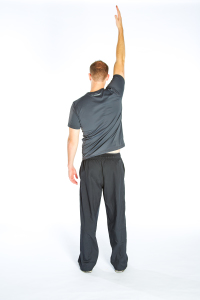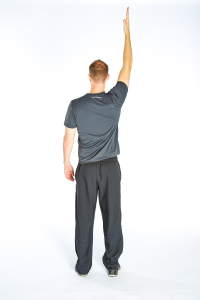One of the most common complaints is a stiff neck. We all are prone to it, especially after long stressful days at work. That’s why when you are working out you’ll want to focus on training bad habits out of your system!
Shoulder elevation is essentially shrugging – the “I dunno” movement you make with your shoulders in a conversation. The prime movers are your upper traps, which are the big muscles making up the side and back of your neck. There are two main factors that cause these muscles to become troublesome, making them tense and stiff and causing discomfort. The first is general posture. Most of us spend too much time sitting, often in front of a computer and it is easy to slump down, driving the shoulders upward and creating stiffness and discomfort. The other problem is how we carry stress. Stress causes the upper traps to tense, much like the hackles of a dog. This is why your shoulders will jump if you hear a loud bang behind you. Given the amount of time that many of us spend sitting, stressed out about one thing or another, it is no wonder that many of us suffer from stiffness around the neck.
With this in mind it is important to pay attention to this factor when working out. In a previous post (Rows – Three Mistakes to Avoid) I talked about this in relation to the seated row. In this post let’s have a quick look at the overhead press.
When overhead pressing the shoulder blades must upwardly rotate in order to achieve full range of motion. This requires work from the upper traps, but when they are overdoing it, as often happens with those of us who have stiff necks and poor posture as described above, we get an ugly result. In this photo you can see an example of excessive elevation. Notice how the space between my shoulder and my right ear has become very small. This is a position at the end range that we want to avoid.
A better end position looks like this – here, the shrugging is not out of control. We still have the necessary rotation in the scapula, but there is not the extra upward shrug.
Why is this important? Firstly, having the proper mechanics allows for a stronger, more effective press. If the shoulder does not achieve its most advantageous position at the end range, then it will be unstable and the lifter will be more prone to injury and less able to generate force. Secondly, and more generally, we need to de-train this habit because having shoulders that are constantly pulled into a shrugged position is both hard on the joint and leads to stiff necks. Try it out in a mirror – can you get your arm overhead without the shrug? If not, fix it, it may just help you feel better all day long.
P.S. – Overhead movements are very tricky, and many of us should not be doing them at all, at least not right away. If you have trouble with the upper neck and with smooth overhead reaching, you should really get some help working on it. That’s what good trainers or even physical therapists are there for. Take advantage!

